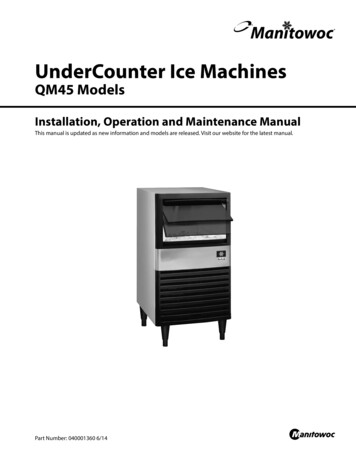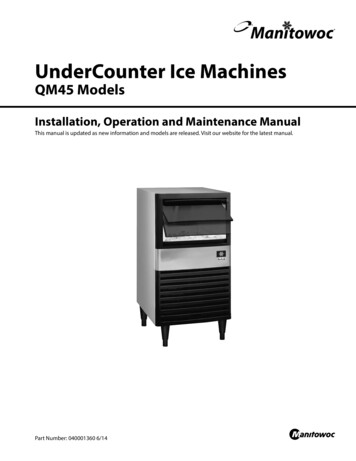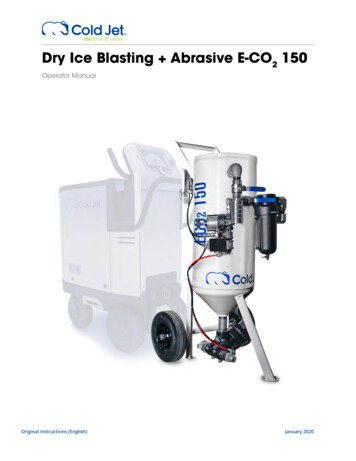
Transcription
DOING BUSINESS IN ITALYINVESTMENT GUIDE 2018
FOREWORDITA - Italian Trade Agency is the Governmental agency that supports the business development of our companies abroad and promotes the attraction of foreign investment in Italy.Through its Foreign Direct Investment Unit, ITA facilitates the establishment and thedevelopment of foreign companies in Italy: promoting business opportunitieshelping foreign investors to establish or expand their operationssupporting investors throughout the investment life cycleoffering high-level tutoring services for existing strategic investments.You can reach us through our 81 branches in 67 countries, there to ensure a worldwidecoverage and customized services.Welcome to Italy, where Business meets Excellence.OUR SUPPORT TO FOREIGN INVESTORSPre-investment informationBusiness set-upAfter care· Market and business environment· Target sectors· Aspects of the tax, legal system and labour market· Incentive programme framework and financial scouting· Italy's competitive advantages· Location scouting & site visit· Authorisations· Permits for foreign investors· Human Resources research· Liaison Office with Public Administration· Networking through diplomatic networks· Recruitment, skills and training support· Cultural mediation
DOING BUSINESS IN ITALYINVESTMENT GUIDE 2018STARTING A BUSINESS IN ITALY51. Establishing a representative office in Italy (local office)52. Establishing an Italian branch of a foreign company63. Setting up a company(independent company or subsidiary of a foreign company)84. Purchase of assets5. Accounting and audit requirements126. Dissolution and liquidation of business entities147. Additional notes on the Business Register and the Notaries15HIRING AND MANAGING STAFF161. Main sources of the employment law162. Start of employment163. Employment relationship174. Employment of foreign workers215. Specific types of contracts246. End of employment257. Collective dismissals278. Workplace safety in Italy299. Labor proceedings2910. Employee representation bodies & Employee participation3011. Social security and assistance system3012. Employment incentives3013. Productivity bonus30
SUMMARYIP REGULATION311. Trademarks312. Patents323. Designs and Models334. Software and Database34TAXATION IN ITALY351. Corporate income tax (i.e. IRES - Imposta sui Redditi delle Società)352. Withholding taxes413. Regional tax on production activities(IRAP, Imposta Regionale sulle Attività Produttive)424. Value added tax (IVA, Imposta sul Valore Aggiunto)435. Municipal tax on property(IMU, Imposta Municipale Unica) and other local taxes.6. Registration tax46477. Personal income tax(IRPEF, Imposta sul Reddito delle Persone Fisiche)488. Tax obligations509. Ruling52
DOING BUSINESS IN ITALYINVESTMENT GUIDE 2018FINANCIAL & TAX INCENTIVES IN ITALY541. R&D Tax Credit542. Patent Box Tax Regime543. Notional Interest Deduction(Aiuto alla Crescita Economica – D.L. N. 201/2011)554. Favourable tax regimes applicable to expatriatesor individuals moving to Italy555. “Super and Hyper amortization” relief576. Other incentives59
STARTING A BUSINESSIN ITALYSTARTING A BUSINESS IN ITALYSeveral and different options are available in order to conduct business in Italy. A number of reforms have beenmade to streamline and simplify the procedures required to start and operate a business in Italy, for exampleby reducing the minimum capital requirements and the paid-in minimum capital requirement as well as by streamlining registration procedures.A business may be operated either as a sole trader or as a company. Both entities are governed by the Italiancivil code.A person may conduct a business either as an individual, or through the setting up of a new company or throughthe purchase of shares/quotes in an existing company.Such opportunities are available both for European and non-European citizens. Individuals or legal persons from EU countries and countries included in the European Economic Area(Iceland, Liechtenstein, Norway) are treated as Italian nationals for the purpose of investing in anew/existing company, without limitations on their capacity to conduct a business. Individuals from countries outside the EU and the European Economic Area must have a valid residence permit or be citizen in a country where reciprocal treaties are applied.All relevant information are available online at the Italian Foreign Office anieri/condizreciprocita1. Establishing a representative office in Italy (local office)Representative offices - which are not legal entities of a foreign company in Italy - are characterized by twoelements: a local presence to promote the company and its products/services and to perform other non-business activities; the local unit does not require a permanent representation (it does not represent the foreign companyvis-a-vis third parties).Local offices must be registered with the Economic and Administrative Index (REA, Repertorio Economico Amministrativo) at the Chamber of Commerce, attaching the following documents: if the company is incorporated in an EU country: a certificate indicating the company’s details andthe legal representatives of the company issued by the foreign equivalent of the Register of Companies in Italy;5
DOING BUSINESS IN ITALYINVESTMENT GUIDE 2018 if the company is incorporated in a non-EU country: a statement of the existence of the company issued by the Italian Embassy in the country where the company has its registered office.In any case, documents in foreign languages must be translated into Italian by a sworn translator.Tax issuesIf the representative office is used only for the following purposes: storage, display or delivery of goods belonging to the foreign company; purchasing goods or obtaining information for the foreign company; conducting preliminary activities assisting the business activities of the foreign company;it would not be considered a permanent establishment from a tax perspective.A representative office is not required to keep books, publish financial statements or file income tax or VAT returns. It is, however, required to keep ordinary accounts in order to document the expenses (e.g. personnelcosts, office equipment, etc.) to be covered by the foreign company.2. Establishing an Italian branch of a foreign companyThe Italian branch/secondary registered office is not a separate legal entity and the parent company is responsible for its initiatives, although it is subject to taxation in the foreign country where the economic activity iscarried out.The definition of permanent establishment (PE) is provided by article 5 of the OECD model tax treaty and by article 162 of the Italian tax code (TUIR).In particular, according to aforementioned articles, “the term permanent establishment means a fixed place ofbusiness through which the business of an enterprise is wholly or partly carried on.The term PE includes especially:a. a place of management;b. a branch;c. an office;d. a factory;e. a workshop, andf. a mine, an oil or gas well, a quarry or any other place of extraction of natural resources.”Therefore, the definition contains the following conditions: the existence of a “place of business”; this place of business must be “fixed”; the carrying on of the activity through this fixed place.According to the above Law, due to the fact that a PE is not easily identifiable, the Italian Authorities (e.g. Revenue agency) can assume the presence of a hidden permanent establishment in Italy of a foreign company ifsome conditions occur (an office in Italy, Italian employees, Italian contracts, Italian managers).6
STARTING A BUSINESSIN ITALYDetails of the branch office must be registered with the Business Register (Registro delle Imprese).The registration of a branch office is governed by the Italian civil code (Codice Civile).In order to incorporate a branch, it will be necessary to:1. draft the Minute of the shareholder’s meeting (or of the Board of Directors Meeting according to the ByLaws) of the foreign parent company resolving:a. to open a branch (including the address of the legal office of the new branch, the business activitythat will be performed and the financial period of the Italian branch);b. to appoint a legal representative or “preposto” (including his personal data);c. to grant the legal representative with the required powers (power of attorney);2. open an Italian fiscal code for the legal representative of the Italian branch (“preposto”);3. draft the act of incorporation in front of an Italian public Notary;4. submit the incorporation act to the Chamber of Commerce;5. submit the commencement activities declaration to the Italian Revenue Agency.The deed of appointment, the certificate of incorporation, the articles of association and the registration detailsof the foreign company must be registered with the Business Register in the area in which the branch office islocated.If foreign companies have more than one branch office in Italy, the publication requirements involving the filingof the abovementioned documents only need to be satisfied for the first Italian branch.For all the aforementioned documents it will be necessary to provide a certified translation in Italian. Besidesall the documents need to be apostilled by a public Notary of the country in which the parent company is located (or issued by a public authority).In case of failure in the registration, directors or anyone acting in the name and on behalf of the company willhave unlimited liability for all company contractual obligations.The foreign company and its directors will be liable for company’s obligations contracted in Italy in its name(except for European companies given the European principle of freedom of establishment).The overall income of a permanent establishment in Italy of a company residing abroad is determined accordingto the rules governing the determination of the company’s income, as if it were a company domiciled in Italy.As established by the OECD’s attribution report, the procedure in order to allocate costs and revenues to a permanent establishment is a two-step process. During the first step, a functional and factual analysis is performed, in which the operations and responsibilities of a permanent establishment are determined so that thepermanent establishment can be assessed for taxation as an independent, separate entity. During the secondstep, the arm’s length profit of the permanent establishment is determined by means of a comparability analysis.7
DOING BUSINESS IN ITALYINVESTMENT GUIDE 2018In order to better define the criteria adopted for the cost (and revenues) allocation between the parent companyand the branch in Italy, it could be useful to draft a cost/revenue agreement. In this regard, it could be appropriateto consider the method recommended by the OECD guiding principles and guidelines used by the Italian taxauthorities.3. Setting up a company (independent company or subsidiary of a foreign company)Italy offers a wide range of choices of legal forms for setting up companies depending on the company’s organizational model, its commercial objectives, the level of capital to be committed, extent of liability and taxand accounting implications.Companies: main typesThere are two main types of companies in Italy: Società a responsabilità limitata (S.r.l.) – limited liability company; Società per Azioni (S.p.A.) – stockholding companies (company limited by shares).The liability of the shareholders/quotaholders is limited to the amount of their contributions to the company.The company’s incorporation deed must be signed in front of a public notary and the company does not officiallyexist until it has been registered with the Business Register.At least 25% of the capital must be paid in on the signing of the Articles of Association (the remainder may bepaid later) although contributions in kind must be made in full.Both types of companies can be incorporated (and, successively, the relevant corporate capital may entirelybe held) by a sole shareholder/quotaholder. In this case, in order to benefit of the limited liability, the corporatecapital must be fully paid-in.Article 2328 and following of the Italian Civil Code (for S.p.A) and Article 2463 (for S.r.l.) list the informationneeded in order to incorporate a company in Italy.The main differences between the two legal forms are related to: corporate Capital. The Law establishes different minimum thresholds for each kind of company; in the S.p.A. the capital consists of shares. The minimum share capital of a S.p.A. is equal to 50,000.00; the amount of the share capital must be stated in the memorandum of association. Shares do nothave to reflect shareholders’ overall investment in the company; the shares are freely transferable. It is normal practice to issue physical share certificates althoughin listed companies it is also permissible for shares to be in the form of simple accounting records,defined as “dematerialized shares”;8
STARTING A BUSINESSIN ITALY the company limited by shares is the main type of trading company best suited to substantial investments with a large number of shareholders. It is also the compulsory type for those companies wishing to be listed on the stock exchange; in the S.r.l. the capital consists of quotas. The minimum capital of a S.r.l. is equal to 1; when setting up limited liability companies with capital equal to or greater than 10,000, at least 25%of the capital must be paid to the directors as previously indicated; when the value of the capital is between 1 and 10,000, contributions may only be in cash and mustbe paid up in full on subscription; the transfer of quotas may be limited and even prohibited; in which case, each shareholder will be entitled to withdraw from the company, obtaining a reimbursement for his/ her quotas; equity contributions. In both S.p.A. and S.r.l., the equity contribution can be made in cash as well asin kind subject to evaluation of an expert. Whereas, in the S.p.A. the expert is appointed by the Court,except in some specific cases, and the evaluation reviewed by the company’s directors; voting rights and special rights. The voting rights in S.p.A. might not be proportional to the percentageof corporate capital subscribed by the shareholders and the by-laws can be provide different typologies of shares; in the S.r.l. the voting rights are proportional to the percentage of corporate capital subscribed by thequotaholders. Even if the by-laws may reserve some special rights to some quotaholders (e.g. administrative rights or the right to the distribution of profits), no different categories of quotas are allowed; governance the S.p.A. can establish different governance models;a. traditional system (shareholders’ meeting, Board of Directors and Board of Statutory Auditors);b. one tier system (Board of Directors and management control committee appointed among themembers of the board) and two tier system (Management Board and a Supervisory Board).The S.r.l. provides different forms of management that include appointing a Sole Managing Director, a Boardof Directors, or even a form of management where Directors are not appointed as a board and where they canexercise their powers jointly or separately, or, depending on the corporate governance model, jointly and othersseparately.In addition, the two following subcategories are provided by the Italian civil code: Società a responsabilità limitata semplificata (S.r.l.s.) – simplified limited liability company; Società in accomandita per Azioni (S.a.p.A.) limited partnership (“partnership limited by shares”).Società a Responsabilità Limitata Semplificata – Simplified limited liability company (S.r.l.s.)The simplified limited liability company (S.r.l.s.) is a form of “S.r.l.” introduced to encourage young entrepreneurship.The shareholders of an “S.r.l.s.” may only be individuals (natural persons), not companies or other bodies. TheS.r.l.s. may also be composed of a single shareholder.Unlike the “ordinary S.r.l.” there is a minimum share capital of 1, up to a maximum of 9,999.99.9
DOING BUSINESS IN ITALYINVESTMENT GUIDE 2018The capital must be fully paid in cash to the administrative body at the time the company incorporation.The incorporation deed must be drafted as a public deed by a notary in accordance with a standard model prescribed by law. Therefore, there are no “articles of association” in a technical sense; there are only standardclauses indicated in the fixed standard model (prescribed by law).No notarial fees are due to the notary.Partnership with shares (Società in accomandita per azioni - S.a.p.A)There are two categories of partners in a limited partnership: general partners who have the responsibility of directors in law and have unlimited personal liability(accomandatari); partners with limited liability who are excluded from taking part in the administration and whose liability is restricted to their investment in the share capital (accomandanti).As in the company limited by shares, investments are delineated by shares while, like a limited partnership, themanagement of the company is conducted by directors with unlimited liability (albeit secondary) for the company’s obligations.In addition to the companies, other entities can be established.Partnership: nature and main typesThe partnership does not have a legal personality although it is still a form of company (società) under Italianlaw.A partnership is characterized by the personal commitment of each partner to their work as a whole within thepartnership. The individual partners are personally liable for the liabilities of the company (including their privateassets) and each acts for the whole business. Possibilities for imposing limitations on individual partners’ liability are restricted.The main types are: Società in nome collettivo (S.n.c.) (general or unlimited partnership).The company’s business name must contain the name of at least one of the partners and an indication that itis an unlimited partnership.The members have unlimited liability for partnership obligations and there can be no agreement to the contrary.When seeking repayment of debts owed by the partnership, creditors must first enforce them against the partnership before applying to the members. The unlimited partnership is subject to bankruptcy law with the contemporaneous bankruptcy of all partners.The partners generally have separately exercisable powers of administration and representation. If agreed, powers of administration may be reserved to some members only. Società in accomandita semplice (S.a.s.) (limited partnership).The limited partnership has two categories of partners:10
STARTING A BUSINESSIN ITALY general partners (soci accomandatari), who are responsible for the administration and managementof the company and who have unlimited liability for the fulfillment of partnership obligations; limited partners (soci accomandanti), who are not directors and will be liable for partnership debtswithin the limits of the investment made in the partnership, subject to certain exceptions governed bylaw.The partnership name (business name) must contain the name of at least one general partner and an indicationthat it is a limited partnership.If a limited partner’s name is included in the partnership name, he or she will have unlimited liability, jointly andseverally with the general partners, for partnership debts.Limited partners cannot perform acts of administration or negotiate or do business in the name of the partnership, except when granted a special power of attorney for specific business activities. Any limited partner whodisregards this prohibition will take on unlimited liability for all partnership debts and may be excluded fromthe partnership itself.4. Purchase of assetsAs an alternative to the previous options, a foreign enterprise may acquire an existing business.A purchase of a business is realized when it concerns a complex of assets (material and juridical items) functionally connected to each other and likely to become an instrument for carrying out a business activity.The purchase of a business is generally a single transaction and it can only be carried on by means of publicnotarial deed or a private deed certified by a notary.The transaction may involve the entire organization, different businesses owned by the same vendor or a singlebusiness unit.Except as otherwise agreed, the transfer of a business involves what follows:11
DOING BUSINESS IN ITALYINVESTMENT GUIDE 2018 in case of a commercial undertaking, within five years from the sale, the seller is barred from startingup a new business whose objects, location or other features is likely to divert the customers; the transfer of receivables and debts related to the transferred company, resulting from the compulsory accounting books; the succession in contracts for the exercise of the business activity which are not of a personal nature.5. Accounting and audit requirementsAccounting requirementsAll companies and partnerships are required to keep books and records of accounts, as well as keep in orderall original documents sent and received for each concern.The accounting documents must be kept for no less than ten years.Accounting records may be kept directly by the business at their premises, or by third parties outside the company offices.There are two main compulsory accounting systems available depending on the company’s features and theamount of income declared in the previous year: one ordinary and one simplified (suitable for small entitieswith a simple organization).The ordinary accounting scheme is compulsory: for company providing services with a turnover exceeding EUR 400,000 yearly; for the other companies with a turnover exceeding EUR 700,000 yearly.The following registers and corporate books can be compulsory on the basis of the size and of the activity performed: the journal; the general ledger; the VAT registers; the inventory register; the shareholders/quotaholders meeting books; the BoD meeting book (if applicable); the Board of Auditors meeting book (if applicable).Books and records of accounts are kept according to the provisions of the Italian Civil Code and the tax regulations.Accounting books can also be kept electronically.Companies with share capital are also required to prepare their annual Financial Statements and to file themwith the Companies Register, within 30 days from its approval by shareholders.12
STARTING A BUSINESSIN ITALYIn addition to the ordinary FS form provided by the Civil Code, a short form and a reduction in the amount ofthe information required are established for “small” and “micro” companies.Partnerships, instead, are required to draw up an annual report indicating profit and loss for tax purposes, although there is no filing obligation with the Register of Companies.Annual accounts must be presented to and approved by the shareholders’ annual general meeting within 120days from the company’s financial year end (180 days in specific situations and under certain conditions).Audit requirementAuditing is required for:1) S.p.A.;2) S.r.l. exceeding two of the following limits for 2 consecutive years; total assets of EUR 4,400,000; sales and services revenues of EUR 8,800,000; average number of employees during the year 50; or, if the S.r.l. controls a company subject to statutory audit;3) all companies drawing up consolidated Financial Statements;4) listed companies;5) banks, stock broking companies, fund management companies, regulated financial institutions.The audit of the financial statements (“revisione legale dei conti”) shall be performed in accordance to theItalian Law and the Italian auditing standards.In Italy, the statutory audit can be assigned to a Board of Statutory Auditors (“Collegio Sindacale”), a sole auditor(“Sindaco Unico”), an audit firm (“società di revisione”) or an external auditor (“revisore”).Under some conditions the audit can be performed by the “Collegio Sindacale” which may be in charge of bothSupervisory activities, including the compliance with the law and the Articles of Association, and on the statutory audit of the financial statements.Alternatively, the statutory audit on the financial statements (including the quarterly checks on the accounts)can be assigned to an audit firm or an external auditor.The assignment to two different bodies is compulsory for listed companies and companies required to prepareconsolidated financial statements.Term of the audit assignmentThe auditors are appointed for a 3 year-term for non-listed companies and for a 9 year-term for listed companies.The audit firm cannot be appointed for more than one 9-year term, while the external auditor cannot be appointed for more than 7 years. The audit firm engagement as well as the external auditor one should guarantee acooling-off period of 4 years.13
DOING BUSINESS IN ITALYINVESTMENT GUIDE 20186. Dissolution and liquidation of business entitiesThe dissolution of a company follows a four-step process, as follows: determining and acknowledging the motivation for winding up the company; carrying out of the liquidation activities, including the appointing of a liquidator; cancellation of the company from the Business Register; filing of corporate books at the Business Register.Reasons for dissolution are common to all types of companies and are provided by article no. 2484 of theItalian civil code: the duration term has expired; the company purpose is finally realized, or, ascertained impossibility of its realization, unless the shareholder’s meeting is convened without delay to resolve upon the necessary amendments to the company’s bylaws; it’s impossible for the company to operate or the shareholder’s meeting is inactive for a prolongedperiod of time; the corporate capital is reduced below the minimum required by the law; for other reasons provided by the Law; the shareholder’s meeting resolves upon the termination of the company; other reasons for winding up may be provided for in the incorporation deed and in the Articles of Association.The directors without delay shall ascertain the occurrence of a reason for the dissolution and shall proceedwith the required actions.When the directors omit the required actions, the court, upon request from a shareholder or director or statutoryauditor, shall ascertain the occurrence of the reason for the termination.Until the appointment of the liquidators, the directors maintain their powers to manage the company, for thesole purpose of the conservation of the corporate assets’ integrity and value.The appointment of the liquidators and the dissolution of the relevant powers shall be entered in the CompaniesRegister at the care of the liquidators.Particular provisions are stated for: the drafting of the interim financial statements during the liquidation period and for the final financialstatements at the end of the procedure; for the submission of the tax returns and related payments in case of corporate or indirect taxes.Except for situations when the winding up of the company takes place on its natural expiry date and for thereasons stated in its incorporation deed, the winding up becomes effective only from the date of the publicationin the Business Register (Registro delle Imprese) of the Directors’ statement setting out the reasons for the liquidation, or from the publication date of the shareholders’ resolution for the liquidation of the company, passedat the shareholders’ meeting.Once the final liquidation FS is approved, the liquidators shall ask the cancellation of the company from theCompanies Register.14
STARTING A BUSINESSIN ITALYWhen the liquidation, the assets distribution or the deposit at the bank (of the sums due to the shareholdersnot collected) are accomplished, the corporate registers shall be filed and kept for ten years at the CompaniesRegister.7. Additional notes on the Business Register and the NotariesThe Business Register or Companies Register (Registro delle Imprese) is part of an extensive information system containing all the main information relating to companies (name, statute, management, headquarters,etc.) and all the subsequent events that have occurred to them after registration (for example changes to thestatute and to company officers, changes in registered address, liquidation, insolvency proceedings, etc.).The Business Register is managed by the Chambers of Commerce.It is a single system of publication for the entire Country although it is managed through provincial offices.The objective of the Register is to publish consistent and reliable quality information, making it available to allthe stakeholders and the businesses operating in Italy.Indeed, information not included in the Business Register cannot be used against third parties, unless it is possible to prove that the latter had knowledge of such facts.A search within the Business Register database (www.registroimprese.it/) will provide sufficient details to confirm the existence of an enterprise.Following registration and the payment of fees, a more detailed search can be conducted and Company report(“Visura”), available both in Italian and English language, downloaded.In Italy many acts need to be drafted in front a Public Notary, who is a public officer.Notaries are independent professionals the quality of whose work is safeguarded by important guarantees andis subject to public oversight.A list of Italian notaries can be found online at the following URL:Consiglio Nazionale del Notariato www.notariato.it/en/trova-notaioAs for other professionals, notaries are legally obliged to carry out checks on their clients, including non-Italiannationals, by completing formalities required by money laundering laws and beneficial owner identification.15
DOING BUSINESS IN ITALYINVESTMENT GUIDE 2018HIRING AND MANAGING STAFFIn the current decade, Ita
DOING BUSINESS IN ITALY INVESTMENT GUIDE 2018 FINANCIAL & TAX INCENTIVES IN ITALY 54 1. R&D Tax Credit 54 2. Patent Box Tax Regime 54 3. Notional Interest Deduction (Aiuto alla Crescita Economica - D.L. N. 201/2011) 55 4. Favourable tax regimes applicable to expatriates or individuals moving to Italy 55 5. "Super and Hyper amortization .










